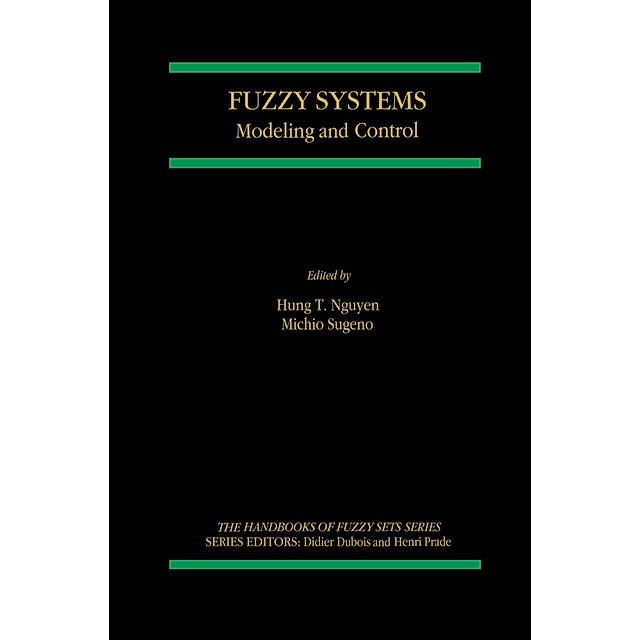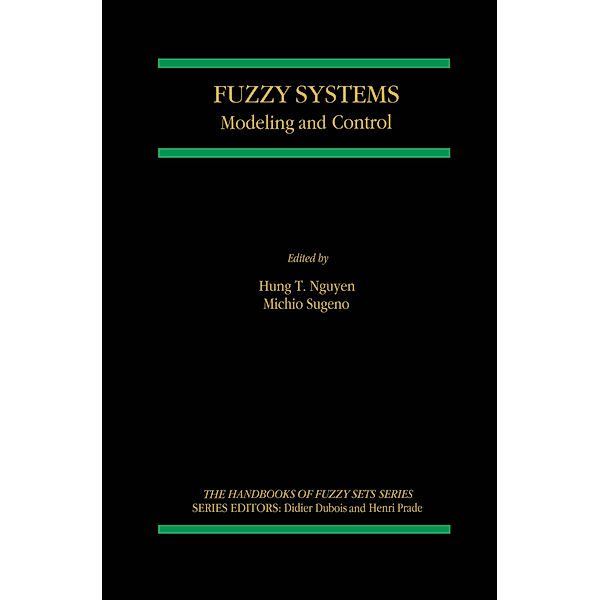Fuzzy Systems
Modeling and Control
(Sprache: Englisch)
The analysis and control of complex systems have been the main motivation for the emergence of fuzzy set theory since its inception. It is also a major research field where many applications, especially industrial ones, have made fuzzy logic famous.
This...
This...
Voraussichtlich lieferbar in 3 Tag(en)
versandkostenfrei
Buch (Kartoniert)
219.99 €
- Lastschrift, Kreditkarte, Paypal, Rechnung
- Kostenlose Rücksendung
- Ratenzahlung möglich
Produktdetails
Produktinformationen zu „Fuzzy Systems “
Klappentext zu „Fuzzy Systems “
The analysis and control of complex systems have been the main motivation for the emergence of fuzzy set theory since its inception. It is also a major research field where many applications, especially industrial ones, have made fuzzy logic famous. This unique handbook is devoted to an extensive, organized, and up-to-date presentation of fuzzy systems engineering methods. The book includes detailed material and extensive bibliographies, written by leading experts in the field, on topics such as:
- Use of fuzzy logic in various control systems.
- Fuzzy rule-based modeling and its universal approximation properties.
- Learning and tuning techniques for fuzzy models, using neural networks and genetic algorithms.
- Fuzzy control methods, including issues such as stability analysis and design techniques, as well as the relationship with traditional linear control.
- Fuzzy sets relation to the study of chaotic systems, and the fuzzy extension of set-valued approaches to systems modeling through the use of differential inclusions.
Fuzzy Systems: Modeling and Control is part of The Handbooks of Fuzzy Sets Series. The series provides a complete picture of contemporary fuzzy set theory and its applications. This volume is a key reference for systems engineers and scientists seeking a guide to the vast amount of literature in fuzzy logic modeling and control.
Inhaltsverzeichnis zu „Fuzzy Systems “
Introduction: The Real Contribution of Fuzzy Systems.- References.- Methodology of Fuzzy Control.- 1.1 Introduction: Why Fuzzy Control.- 1.2 How to Translate Fuzzy Rules into the Actual Control: General Idea.- 1.3 Membership Functions and Where They Come From.- 1.4 Fuzzy Logical Operations.- 1.5 Modeling Fuzzy Rule Bases.- 1.6 Inference From Several Fuzzy Rules.- 1.7 Defuzzification.- 1.8 The Basic Steps of Fuzzy Control: Summary.- 1.9 Tuning.- 1.10 Methodologies of Fuzzy Control: Which Is The Best?.- References.- to Fuzzy Modeling.- 2.1 Introduction.- 2.2 Takagi-Sugeno Fuzzy Model.- 2.3 Sugeno-Kang Method.- 2.4 Sofia.- 2.5 Conclusion.- References.- Fuzzy Rule-Based Models and Approximate Reasoning.- 3.1 Introduction.- 3.2 Linguistic Models.- 3.3 Inference with Fuzzy Models.- 3.4 Mamdani (Constructive) and Logical (Destructive) Models.- 3.5 Linguistic Models With Crisp Outputs.- 3.6 Multiple Variable Linguistic Models.- 3.7 Takagi-Sugeno-Kang (TSK) Models.- 3.8 A General View of Fuzzy Systems Modeling.- 3.9 MICA Operators.- 3.10 Aggregation in Fuzzy Systems Modeling.- 3.11 Dynamic Fuzzy Systems Models.- 3.12 TSK Models of Dynamic Systems.- 3.13 Conclusion.- References.- Fuzzy Rule Based Modeling as a Universal Approximation Tool.- 4.1 Introduction.- 4.2 Main Universal Approximation Results.- 4.3 Can We Guarantee That the Approximation Function has the Desired Properties (Such as Smoothness, Simplicity, Stability of the Resulting Control, etc.)?.- 4.4 Auxiliary Approximation Results.- 4.5 How to Make the Approximation Results More Realistic.- 4.6 From All Fuzzy Rule Based Modeling Methodologies That are Universal Appriximation Tools, Which Methodology Should We Choose?.- 4.7 A Natural Next Question: When Should We Choose Fuzzy Rule Based Modeling in the First Place? andWhen is, Say, Neural Modeling Better?.- References.- Fuzzy and Linear Controllers.- 5.1 Introduction.- 5.2 Modal Equivalence Principle.- 5.3 Application to PI Controllers.- 5.4 Application to State
... mehr
Feedback Fuzzy Controllers.- 5.5 Equivalence for Sugeno's Controllers.- 5.6 Conclusion.- References.- Designs of Fuzzy Controllers.- 6.1 Introduction.- 6.2 Fuzzy Control Techniques.- 6.3 The FC as a Nonlinear Transfer Element.- 6.4 Heuristic Control and Model Based Control.- 6.5 Supervisory Control.- 6.6 Adaptive Control.- References.- Stability of Fuzzy Controllers.- 7.1 Introduction.- 7.2 Stability Conditions Based on Lyapunov Approach.- 7.3 Fuzzy Controller Design.- References.- Learning and Tuning of Fuzzy Rules.- 8.1 Introduction.- 8.2 Learning Fuzzy Rules.- 8.3 Tuning Fuzzy Rules.- 8.4 Learning and Tuning Fuzzy Rules.- 8.5 Summary and Conclusion.- References.- Neurofuzzy Systems.- 9.1 Introduction.- 9.2 Synergy of Neural Networks and Fuzzy Logic.- 9.3 Fuzzy sets in the technology of neurocomputing.- 9.4 Hybrid Fuzzy Neural Computing Structures.- 9.5 Fuzzy Neurocomputing - a Fusion of Fuzzy and Neural Technology.- 9.6 Constructing Hybrid Neurofuzzy Systems.- 9.7 Summary.- References.- Neural Networks and Fuzzy Logic.- 10.1 Introduction.- 10.2 Liquid Level Control Problem.- 10.3 Fuzzy Rule Development.- 10.4 Integrated System Architectures.- 10.5 FNN3 Training Algorithm.- 10.6 Conclusions.- References.- Fuzzy Genetic Algorithms.- 11.1 Introduction.- 11.2 What is a Genetic Algorithm?.- 11.3 Fuzzy Genetic Algorithms.- 11.4 Fuzzy Genetic Programming.- References.- Fuzzy Systems, Viability Theory and Toll Sets.- 12.1 Introduction.- 12.2 Convexification Procedures.- 12.3 Toll Sets.- 12.4 Fuzzy or Toll Differential Inclusions.- References.- Chaos and Fuzzy Systems.- 13.1Introduction.- 13.2 Preliminaries.- 13.3 Dynamical Systems and Chaos.- 13.4 Information Content of Fuzzy Sets.- 13.5 Chaotic Mappings on (Dn, d?).- 13.6 r-Fuzzification..- 13.7 Chaos and Fuzzification.- 13.8 Nondegenerate Periodicities and Chaos.- 13.9 Examples of Fuzzy Chaos.- 13.10 Conclusion.- 13.11 Appendix.- References.
... weniger
Bibliographische Angaben
- 2012, Softcover reprint of the original 1st ed. 1998, XXI, 519 Seiten, Maße: 15,5 x 23,5 cm, Kartoniert (TB), Englisch
- Herausgegeben: Hung T. Nguyen, Michio Sugeno
- Verlag: Springer, Berlin
- ISBN-10: 1461375150
- ISBN-13: 9781461375159
Sprache:
Englisch
Kommentar zu "Fuzzy Systems"




Schreiben Sie einen Kommentar zu "Fuzzy Systems".
Kommentar verfassen